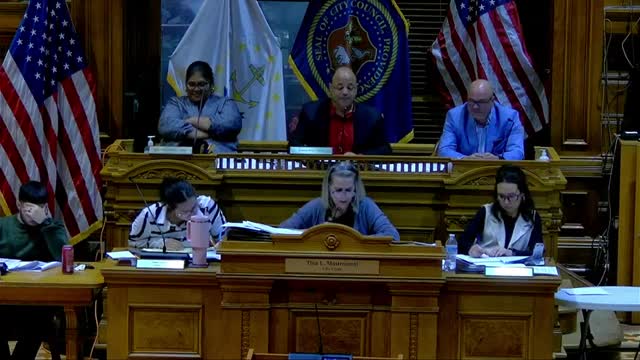Providence committee advances entertainment ordinance changes after hours, format amendments; public hearing continued
Get AI-powered insights, summaries, and transcripts
Subscribe
Summary
The Committee on Ordinance heard hours, scope and enforcement questions about proposed changes to the City of Providence zoning ordinance governing incidental and temporary entertainment, adopted two committee amendments and continued the item for final action.
The Committee on Ordinance on Oct. 22 discussed proposed amendments to Chapter 27 of the City of Providence Code of Ordinances that would change how incidental and temporary entertainment are regulated, approved two committee amendments and continued the matter for further review.
The committee’s deputy planning director, Robert Azar, told members the proposal would broaden the definition of incidental entertainment to allow live amplified performances and prerecorded playlists while keeping a prohibition on sound permeating beyond premises and retaining noise-ordinance protections. Joe Wilson, director of the Department of Art, Culture, and Tourism, urged the committee to adopt the changes as written, saying they would “bring our zoning and entertainment laws in line with how entertainment actually works in Providence.”
Supporters from the hospitality and arts sectors told the committee the changes would help restaurants, small venues and local musicians, while many residents and neighborhood advocates said enforcement is already inadequate and the expansion risks worsening chronic noise problems.
Committee amendments and next steps
Councilman Oscar Vargas moved — and Councilwoman Shelly Peterson seconded — two committee amendments that the panel adopted. The first amendment revised curfew language so incidental live music would “cease at 9:00 p.m. Sunday through Thursday and 11:00 p.m. on Friday, Saturday, and the night before a city‑recognized holiday.” The second amendment explicitly listed trivia and karaoke among formats allowed as incidental entertainment (alongside live performance and prerecorded playlists).
After lengthy public testimony from business owners and residents, the committee closed the public hearing and voted to continue the ordinance for final consideration at a later date.
What’s in the proposal
- Incidental entertainment: The draft removes the old cap on acoustic instruments and allows live performances (amplified so long as sound is contained to the premises), prerecorded music from a preselected playlist, and now trivia/karaoke as incidental entertainment. It retains prohibitions on cover charges, lasers/strobe lighting and a requirement that sound not be heard off-premises under the city’s noise ordinance.
- Temporary entertainment: The draft moves temporary entertainment licensing from a temporary use permit issued by the Department of Inspections and Standards to a temporary entertainment license issued by the Board of Licenses. Temporary events would be limited to nine per calendar year per licensee, with a maximum duration of three days per event and at least 30 days between events; temporary structures must be removed within five days.
- Enforcement and process: Planning staff said the Board of Licenses has more post‑hour inspection capacity than the zoning official, and the draft relies on the board for enforcement of licensed temporary entertainment. Staff and some council members acknowledged existing enforcement gaps and asked for clearer operational language and implementation details before final approval.
Public testimony and concerns
More than 80 people signed up to speak. Business owners described improved summer revenues and the need to attract customers; one restaurateur said outdoor entertainment “helped business, which also helps my employees.” Arts and hospitality representatives argued that the changes would support a nearly $1 billion creative‑economy sector and called the revisions a needed modernization.
Neighborhood residents and anti‑noise advocates said enforcement is weak and described years of noisy nights, repeated calls to police and licensing hearings that produced few consequences. One resident said police and licensing “failed” to stop a long‑running nuisance nightclub and urged the council to fix enforcement before expanding entertainment rights.
Why it matters
The changes would shift some entertainment approvals from an administrative temporary use permit to a public licensing process and broaden the range of incidental activities allowed without a license. The committee’s decision to continue the item reflects competing priorities: supporting small businesses and artists while addressing resident concerns about enforcement and neighborhood quality of life.
What’s next
The committee adopted the two amendments and left the ordinance open for further edits and final action at a later meeting. Staff said they would work on clarifications requested by council members, including more specific language about holidays and the operator responsibilities that enforcement agencies would use.
